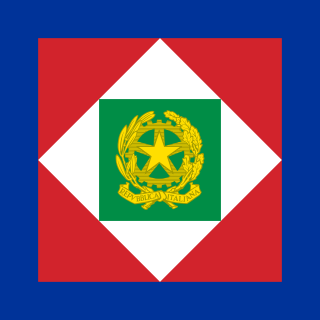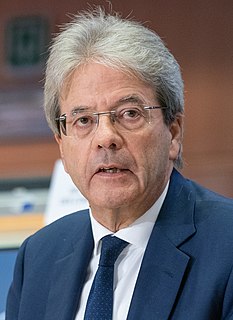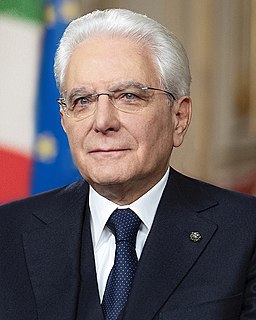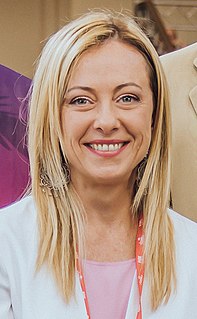
Giovanni Leone was an Italian politician,jurist,and university professor. A founding member of the Christian Democracy (DC),Leone served as the President of Italy from December 1971 until June 1978. He also briefly served as Prime Minister of Italy from June to December 1963 and again from June to December 1968. He was also the president of the Chamber of Deputies from May 1955 until June 1963.

The Italian Parliament is the national parliament of the Italian Republic. It is the representative body of Italian citizens and is the successor to the Parliament of the Kingdom of Italy (1861–1943),the transitional National Council (1945–1946) and the Constituent Assembly (1946–1948). It is a bicameral legislature with 600 elected members and a small number of unelected members. The Italian Parliament is composed of the Chamber of Deputies,as well as the Senate of the Republic.

Pier Ferdinando Casini is an Italian politician. He served as President of the Chamber of Deputies from 2001 to 2006.

The president of Italy,officially denoted as president of the Italian Republic is the head of state of Italy. In that role,the president represents national unity,and guarantees that Italian politics comply with the Constitution. The president is the commander-in-chief of the Italian Armed Forces and chairs the High Council of the Judiciary. A president's term of office lasts for seven years. The incumbent president is former constitutional judge Sergio Mattarella,who was elected on 31 January 2015,and re-elected on 29 January 2022.

Paolo Gentiloni Silveri is an Italian politician who has served as European Commissioner for Economy in the von der Leyen Commission since 1 December 2019. He previously served as prime minister of Italy from December 2016 to June 2018.

Sergio Mattarella is an Italian politician,jurist,academic and lawyer who has served as the president of Italy since 2015.

The judiciary of Italy is a system of courts that interpret and apply the law in the Italian Republic. In Italy,judges are public officials and,since they exercise one of the sovereign powers of the State,only Italian citizens are eligible for judgeship. In order to become a judge,applicants must obtain a degree of higher education as well as pass written and oral examinations. However,most training and experience is gained through the judicial organization itself. The potential candidates then work their way up from the bottom through promotions.

The 2015 Italian presidential election was held on 29–31 January,following the resignation of President Giorgio Napolitano on 14 January 2015. The office was held at the time of the election by Senate President Pietro Grasso in an acting capacity. Only members of Italian Parliament and regional delegates are entitled to vote. As head of state of the Italian Republic,the President has a role of representation of national unity and guarantees that Italian politics comply with the Italian Constitution,in the framework of a parliamentary system.

A constitutional referendum was held in Italy on 4 December 2016. Voters were asked whether they approved a constitutional law that amends the Italian Constitution to reform the composition and powers of the Parliament of Italy,as well as the division of powers between the State,the regions,and administrative entities.

The High Council of the Judiciary is an Italian institution of constitutional importance,which regulates the Ordinary Judiciary of Italy. The High Council is based in the Palazzo dei Marescialli,in Piazza Indipendenza 6.

The 2022 Italian general election was a snap election held in Italy on 25 September 2022. After the fall of the Draghi government,which led to a parliamentary impasse,President Sergio Mattarella dissolved the parliament on 21 July,and called for new elections. Regional elections in Sicily were held on the same day. The results of the general election showed the centre-right coalition led by Giorgia Meloni's Brothers of Italy,a radical-right political party with neo-fascist roots,winning an absolute majority of seats in the Italian Parliament. Meloni was appointed Prime Minister of Italy on 22 October,becoming the first woman to hold that position.

DiventeràBellissima is a regionalist and conservative political party active in Sicily,Italy. The party is led by Nello Musumeci,the President of Sicily,who is also affiliated to Brothers of Italy.

Italexit,whose complete name is Italexit for Italy,is a Eurosceptic political party in Italy,which advocates the country's exit from the eurozone and the European Union. Its founder and current leader is Gianluigi Paragone,senator and former TV journalist,who has defined himself as a "conservative",and presented Italexit as a "conservative party".

Alternativa is a populist and Eurosceptic political party in Italy. It was established in February 2021 as a parliamentary sub-group of the Mixed Group named L'Alternativa c'è. Its members are former deputies of the Five Star Movement who were expelled from the party for having voted against Mario Draghi's government.

The 2022 Italian presidential election was held in Rome between 24 and 29 January 2022. The president of Italy was elected by a joint assembly composed of the Italian Parliament and regional representatives. The election process extended over multiple days,culminating in incumbent president Sergio Mattarella being confirmed for a second term,with a total of 759 votes on the eighth ballot. This was the second most votes ever received by a presidential candidate. Mattarella became the second president to be re-elected,his predecessor Giorgio Napolitano being the first.

Angelo Buscema is an Italian magistrate and academic.

Carlo Nordio is the Italian Minister of Justice,and a former magistrate and prosecutor. In 2022,he was the candidate of Brothers of Italy for President of Italy. In 2022 he was elected to the Chamber of Deputies.

Antonino "Nino" Di Matteo is an Italian magistrate and prosecutor. Since 2012,he is serving as president of the National Magistrates Association of Palermo and since 2019,he is a member of the High Council of the Judiciary. Due to his anti-mafia activity,Di Matteo has been under guard since 1993.
A five-part abrogative referendum was held in Italy on 12 June 2022. Voters were asked to decide on the repeal of five articles or decrees relating to the functioning of the Italian judicial system. Each of the five questions was submitted by nine Italian regions,all governed by the centre-right coalition.

Paolo Zangrillo is an Italian politician and business executive,and the Minister for Public Administration in the Meloni government since October 22,2022.



















